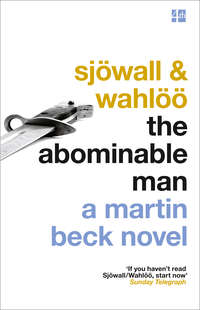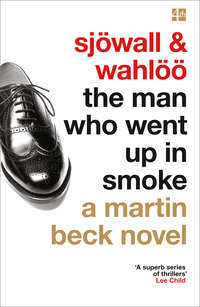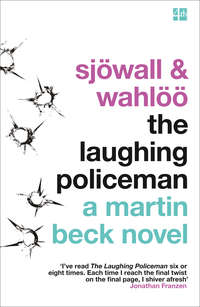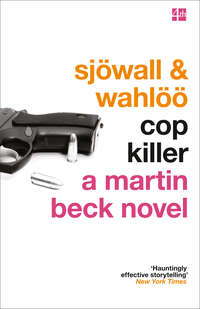
Полная версия
The Terrorists
Sexually she was not his type, if he even had a type, but he was intensely curious about who she could be. Viewed from behind, he could see that she was compactly built, without being in the least plump.
If he had asked Martin Beck, who was standing around in a corner of the foyer, he might have learned something. For instance, that she was not thirty-five but thirty-nine, that she had a considerable background in sociology, and that at present she was working for social services. Martin Beck knew a great deal about her in fact, but had very little information he wished to proffer, as most of it was of a personal nature. Possibly he would have said, if anyone had asked him, that her name was Rhea Nielsen.
Twenty-two minutes after the prescribed time, the doors were thrown open and Crasher appeared. He was carrying a smouldering cigar in one hand and his papers in the other. He studied the documents phlegmatically and the judge had to clear his throat meaningfully three times before he absently handed the cigar to the court official to remove from the courtroom.
‘Mr Braxén has now arrived,’ said the judge acidly. ‘May we ask whether there is any further objection to starting the case?’
Bulldozer shook his head and said, ‘No, certainly not. Not as far as I'm concerned.’
Braxén rose and walked to the middle of the floor. He was considerably older than anyone else in the room, a man of authority with an impressive stomach. He was also remarkably badly and unfashionably dressed, and a none too squeamish cat could have made a good meal from the food stains on his waistcoat. After a long silence, during which he fixed Bulldozer with a peculiar look, he said, ‘Apart from the fact that this little girl should never have been brought to court, I have no judicial objections. Speaking purely technically.’
‘Would the counsel for the prosecution now introduce the case,’ said the judge.
Bulldozer leaped up from his chair and with his head down began plodding round the table on which his papers lay.
‘I maintain that Rebecka Lind on Wednesday the twenty-second of May this year committed armed robbery of the PK Bank's branch in Midsommarkransen, and thereafter was guilty of assaulting an official in that she resisted the policemen who came to take her into custody.’
‘And what does the accused say?’
‘The accused pleads not guilty,’ said Braxén. ‘And so it is my duty to deny all of this … drivel.’
He turned to Bulldozer again and said in melancholy tones: ‘What does it feel like to persecute innocent people? Rebecka is as innocent as the carrots in the ground.’
Everyone appeared to ponder this novel image. Finally the judge said, ‘It is for the Court to decide that, is it not?’
‘Unfortunately,’ said Crasher.
‘What is meant by that remark?’ said the judge, with a certain sharpness. ‘Would Mr Olsson please now state his case?’
Bulldozer looked at the spectator, who, however, returned his gaze so directly and demandingly that after a brief glance at Braxén, he let his gaze wander over the judge, the assistant judge and the jury, after which he fixed it on the accused. Rebecka Lind's own gaze seemed to be fixed in space, far from crazy bureaucrats and all other possible good and evil.
Bulldozer clasped his hands behind his back and began walking back and forth. ‘Well, Rebecka,’ he said in a friendly way, ‘what has happened to you is unfortunately something that happens to many young people today. Together we will try to help you … I suppose I may use your first name?’
The girl did not seem to have heard the question, if it was one.
‘Technically speaking, this is an open-and-shut case, about which there can be little discussion. As was evident at the arraignment –’
Braxén had appeared to be sunk in his thoughts, but now he suddenly jerked a large cigar out of his inside pocket, pointed it at Bulldozer's chest and cried, ‘I object! Neither I nor any other lawyer was present at the arraignment. Was this girl Camilla Lund even informed of her right to counsel?’
‘Rebecka Lind,’ said the assistant judge.
‘Yes, yes,’ said Crasher impatiently. ‘That makes her arrest illegal.’
‘Not at all,’ said Bulldozer. ‘Rebecka was asked and she said it didn't matter. It didn't, either. As I will shortly show, the case was crystal clear.’
‘The very arraignment was illegal,’ said Crasher conclusively. ‘I would like my objection to be entered in the record.’
‘So, Rebecka,’ continued Bulldozer, with that winning smile that was one of his main assets. ‘Let us now, clearly and truthfully, try to clarify the actual course of events, what happened to you on the twenty-second of May and why it happened. You robbed a bank, certainly out of desperation and thoughtlessness, and then assaulted a policeman.’
‘I object to counsel's choice of words,’ said Crasher. ‘I object to counsel for the prosecution's attitude towards both myself and this girl.’
Bulldozer for once appeared put out. But he soon collected himself and, in as good form as ever, gesticulating and smiling, pursued his case to its conclusion, despite the fact that Braxén interrupted him no fewer than forty-two times, often with totally incomprehensible objections.
Briefly, the case was as follows: Shortly before two o'clock on the twenty-second of May, Rebecka Lind had walked into the PK Bank's branch in Midsommarkransen and gone up to one of the cashiers. She had been carrying a large shoulder bag, which she placed on the counter. She then demanded money. The cashier noticed that she was armed with a large knife and set off the police alarm with her foot as she began to fill the bag with bundles of notes, amounting to a sum of five thousand Swedish kronor. Before Rebecka Lind had time to leave the bank with her booty, the first of the radio patrol cars arrived. Two policemen with guns drawn went into the bank and disarmed the robber, at which a certain tumult arose, during which the notes were scattered over the floor. The police arrested the robber, and the prisoner offered violent resistance, inflicting on the policemen damage to their uniforms. They drove her to the station on Kungsholm. The robber, who turned out to be eighteen-year-old Rebecka Lind, was taken first to the Criminal Division duty office and was then transferred to the special department concerned with bank robberies. She was immediately charged with suspected armed robbery of a bank and assault of a policeman, and the following day was formally arraigned at a singularly brief transaction before the Stockholm assize court.
Bulldozer admitted that certain judicial formalities had not been observed in connection with the arraignment, but pointed out that, technically speaking, these were of no importance. Rebecka Lind had herself been quite uninterested in her defence, and she had also immediately confessed that she had gone to the bank to get money.
Everyone began to glance at the clock, but Bulldozer Olsson did not approve of adjournments and promptly called his first witness, Kerstin Franzén, the bank cashier. Her testimony was short and confirmed in all respects what had already been said.
Bulldozer asked: ‘When did you realize that this was a holdup?’
‘As soon as she threw her bag on the counter and demanded money. And then I saw the knife. It looked awfully dangerous. A kind of dagger.’
‘Why did you hand over the money?’
‘We've had instructions not to offer resistance in situations like this, but to do what the robber says.’
This was true. The banks did not wish to run the risk of paying out life insurance and expensive damages to employees who were injured.
A clap of thunder seemed to shake the venerable courtroom. In fact it was Hedobald Braxén belching. This did not happen all that seldom and was one of the many reasons for his nickname.
‘Has the defence any questions?’
Crasher shook his head. He was busy writing something down on a piece of paper.
Bulldozer called his next witness.
Kenneth Kvastmo stepped up and laboriously repeated the oath. His testimony began with the usual litany: occupation police constable, born in Arvika in nineteen hundred and forty-two; first served in patrol cars in Solna and later in Stockholm.
Bulldozer said, foolishly, ‘Tell us in your own words.’
‘What?’
‘What happened, of course.’
‘Yes,’ said Kvastmo. ‘She was standing there, the murderess. Well, she didn't manage to murder nobody, of course. Karl didn't do nothing, as usual, of course, so I threw myself on her like a panther.’
The image was unfortunate. Kvastmo was a large, shapeless man with a fat bottom, a bull neck and fleshy features.
‘I got hold of her right hand just as she was trying to pull out the knife, and then I told her she was under arrest and then I just arrested her. I had to carry her out to the car and in the back seat she resisted arrest violently and then it turns out she was assaulting an officer of the law because one of my shoulder flaps almost come off and my wife was furious when she had to sew it on because there was something on TV she was going to watch and also a button had almost came off my uniform and she didn't have no blue thread, Anna-Greta, my wife, I mean. And when we was done in the bank, then Karl drove us to the station. There wasn't nothing else after that except she called me a pig, but that's not really insulting a policeman. A pig don't cause no disrespect or contempt of the force, I mean neither to the individual officer which in this case was me, or to the force as a whole, does it? She's the one, over there, that said it.’ He pointed to Rebecka Lind.
While the policeman was revealing his narrative abilities, Bulldozer was watching the woman spectator, who had been busily taking notes and was now sitting with her elbows on her thighs, her chin in her hands, as she attentively watched both Braxén and Rebecka in turn. Her face looked troubled, or rather expressed profound unease. She bent down and scratched an ankle with one hand as she chewed a nail on the other hand. Now she was looking at Braxén again and her half-closed blue eyes expressed a mixture of resignation and hesitant hope.
Hedobald Braxén appeared to be only just physically present, and there was no indication whatsoever that he had heard a word of the evidence.
‘No questions,’ he said.
Bulldozer Olsson was satisfied. The case was open-and-shut, exactly as he had said from the start. The only fault was that it had taken so long. Now when the judge suggested an hour's adjournment, he nodded his approval enthusiastically and rushed towards the door with short, bouncing steps.
Martin Beck and Rhea Nielsen used the break to go to the Amarante. After open sandwiches and beer, they finished off with coffee and brandy. Martin Beck had had several boring hours. He had gone up to the station for a spell with Rönn and Strömgren, but that had not been particularly rewarding. He had never liked Strömgren and his relationship with Rönn was complicated. The simple truth was that he no longer had any friends left at the station on Kungsholmsgatan; both there and at the National Police Administration there were a number of people who admired him, others who detested him and a third group, the largest, who quite simply envied him. Out at Västberga, too, he had no friends since Lennart Kollberg had left. Benny Skacke had applied for the job and got it, on Martin Beck's recommendation. Their relationship was fairly good, but from that to genuine warmth was a long step. Sometimes he just sat and stared into space, wishing Kollberg were back; to be perfectly honest – and he found that easy nowadays – he mourned for him the way you mourn for a child or a lost love.
He sat chatting for a while in Rönn's room, but not only was Rönn indifferent company, he also had a lot to do.
‘Wonder how things are with Gunvald,’ said Rönn. ‘I wouldn't mind trading places with him. Bullfights and palm trees and expense-account dinners, boy oh boy!’
Rönn specialized in giving Martin Beck a guilty conscience. Why couldn't he have been offered that trip, he who certainly needed more encouragement than anyone else?
It was impossible to tell Rönn the truth – that he had actually been discriminated against simply because they considered it impossible to send out a runny-nosed northerner, a man with a notably unrepresentative appearance who could only with the greatest goodwill be said to speak passable English.
But Rönn was a good detective. He had been nothing much to start with, but now he was undoubtedly one of the section's greatest assets.
As usual, Martin Beck tried but failed to find something encouraging to say, and shortly he left.
Now he was sitting with Rhea, and that in truth was quite a different matter. The only trouble was that she seemed sad.
‘This trial,’ she said. ‘Christ, it's depressing! And the people who decide things! The prosecutor is just a buffoon. And the way he stared at me, as if he'd never seen a woman before.’
‘Bulldozer,’ said Martin Beck. ‘He's seen lots of women and besides he's not your type.’
‘And the defence lawyer doesn't even know his client's name! That girl hasn't a hope in heaven.’
‘It's not over yet. Bulldozer wins almost all his cases, but if he does lose one occasionally, it's always to Braxén. Do you remember that Swärd business?’
‘Do I remember!’ said Rhea. She laughed hoarsely. ‘When you came and stayed at my place the first time. The locked room and all that. Two years ago almost. How could I not remember?’
She looked happy, and nothing could have made him happier. They had had good times since then, full of talk, jealousy, friendly quarrels and, not least, good spells of sex, trust and companionship. Although he was over fifty and thought he had experienced most things, he had still opened up with her. Hopefully, she shared his feelings about the relationship, but on that point he was more uncertain. She was physically stronger and the more free-thinking of the two of them, presumably also more intelligent, or at any rate quicker-thinking. She had plenty of bad points, among others that she was often cross and irritable, but he loved them. Perhaps that expression was stupid or far too romantic, but he could find no better one.
He looked at her and became aware that he had stopped being jealous. Her large nipples were thrusting out beneath the material, her shirt was carelessly buttoned, she had taken off her sandals and was rubbing her naked feet against each other under the table. Now and again she bent down and scratched her ankles. But she was herself and not his; perhaps that was the best thing about her.
Her face became troubled at this moment, the irregular features set in an expression of anxiety and distaste. ‘I don't understand much about the law,’ she said, with little truth, ‘but this case appears lost. Can't you say something to change it when you testify?’
‘Hardly. I don't even know what he wants out of me.’
‘The other defence witnesses seem useless. A bank director and a home economics teacher and a policeman. Were any of them even there?’
‘Yes, Kristiansson. He was driving the patrol car.’
‘Is he as dumb as the other cop?’
‘Yes.’
‘And I don't suppose the case can be won on the closing argument – the defence's, I mean?’
Martin Beck smiled. He should have known she would get this seriously involved.
‘No, it doesn't seem likely. But are you sure the defence ought to win and that Rebecka isn't guilty?’
‘The investigation is a load of rubbish. The whole case ought to be turned back over to the police – nothing's been properly investigated. I hate the police on that score alone. They hand over cases to the prosecutor's office that aren't even half completed. And then the prosecutor struts around like a turkey cock on a rubbish tip and the people who are supposed to judge are only sitting there because they're politically useless and no good for anything else.’
In many ways she was right. The jury were scraped from the bottom of the political party barrels, they were often friends of the prosecutor, or let themselves be dominated by strong-willed judges who fundamentally despised them.
‘It may sound odd, I know,’ said Martin Beck, ‘but I think you underestimate Braxén.’
On the short walk back to the courthouse, Rhea suddenly took his hand. That seldom happened and always meant that she was worried or in a state of great emotional tension. Her hand was like everything else about her, strong and reliable.
Bulldozer came into the foyer at the same time as they did, one minute before the court was to reconvene. ‘That bank robbery on Vasagatan is all cleared up,’ he said breathlessly. ‘But we've got two new ones instead, and one of them …’
His gaze fell on Kvastmo and he set off without even finishing the sentence. ‘You can go home,’ he told Kvastmo. ‘Or back on duty. I would take it as a personal favour.’
This was Bulldozer's way of bawling someone out.
‘What?’ said Kvastmo.
‘You can go back on duty,’ said Bulldozer. ‘Every man is needed at his post.’
‘My evidence took care of that gangster chick, didn't it?’ said Kvastmo.
‘Yes,’ said Bulldozer. ‘It was brilliant.’
Kvastmo left to carry on his struggle against the gangster community in other arenas.
The court reconvened and the case continued.
Braxén called his first witness, Rumford Bondesson, bank director. After the formalities, Braxén suddenly pointed at the witness with his unlit cigar and said inquisitorially, ‘Have you ever met Rebecka Lind?’
‘Yes.’
‘When?’
‘About a month ago. The young lady came to the head office of the bank. She was dressed in the same clothes as now, but she was carrying an infant in some kind of harness on her chest.’
‘And you received her?’
‘Yes. I had a few moments to spare, as it happened, and I am also interested in modern young people.’
‘Especially the female kind?’
‘Yes. I don't mind admitting it.’
‘How old are you, Mr Bondesson?’
‘Fifty-nine.’
‘What did Rebecka Lind want?’
‘To borrow money. Clearly she had no idea whatsoever about the simplest financial matters. Someone had told her that banks lend money, so she went to the nearest big bank and asked to speak to the manager.’
‘And what did you reply?’
‘That banks were commercial enterprises which didn't lend money without interest and security. She replied that she had a goat and three cats.’
‘Why did she want to borrow money?’
‘To go to America. Just where in America she didn't know, and neither did she know what she was going to do when she got there. But she had an address, she said.’
‘What else did she say?’
‘She asked if there was a bank that was not so commercial, that was owned by the people and to which ordinary people could go when they needed money. I replied, mostly in fun, that the Credit Bank, or the PK Bank as it is called nowadays, was at least officially owned by the state, and so by the people. She appeared to be satisfied with that answer.’
Crasher went up to the witness, jabbed the cigar against his chest and asked, ‘Was anything else said?’
Mr Bondesson did not reply, and finally the judge said, ‘You're under oath, Mr Bondesson. But you do not have to answer questions which reveal criminal activities on your part.’
‘Yes,’ said Bondesson, with obvious reluctance. ‘Young girls are interested in me and I in them. I offered to solve her short-term problems.’
He looked around and caught an annihilating look from Rhea Nielsen and the glint of a bald head from Bulldozer Olsson, who was deep in his papers.
‘And what did Rebecka Lind say to that?’
‘I don't remember. Nothing came of it.’
Crasher had returned to his table. He rummaged around in his papers and said, ‘At the police interrogation, Rebecka said that she had made the following remarks: “I loathe dirty old men” and “I think you're disgusting.”’ Crasher repeated in a loud voice: ‘Dirty old men.’ With a gesture of his cigar, he implied that as far as he was concerned the interrogation was over.
‘I do not understand at all what this has to do with the case,’ said Bulldozer without even looking up.
The witness stepped down with an injured air.
Then it was Martin Beck's turn. The formalities were as usual, but Bulldozer was now more attentive and followed the defence's questions with obvious interest.
‘Yesterday,’ said Crasher when the preliminaries were over, ‘I received word that a certain Filip Trofast Mauritzon had been refused the right to appeal to the High Court. As you may remember, Chief Inspector Beck, Mauritzon was convicted over eighteen months ago of murder in connection with armed robbery of a bank. The prosecutor in the case was my perhaps not-all-that-learned friend, Sten Robert Olsson, who at that time went under the title of Royal Prosecutor. I myself had the thankless and for my profession often morally burdensome task of defending Mauritzon, who undoubtedly was what we call in everyday speech a “criminal”. I would now like to ask one single question: Do you, Chief Inspector Beck, consider that Mauritzon was guilty of the bank robbery and the murder connected with it, and that the investigation presented by present counsel for the prosecution, Mr Olsson, was satisfactory from a police viewpoint?’
‘No,’ said Martin Beck.
Although Bulldozer's cheeks had suddenly taken on a pink hue which matched his shirt and enhanced even further his monstrous tie with its golden mermaids and hula-hula dancers, he smiled happily and said, ‘I, too, would like to ask a question. Did you, Chief Inspector Beck, take any part in the investigation of the murder at the bank?’
‘No,’ said Martin Beck.
Bulldozer slapped his hands together in front of his face and nodded in a self-satisfied way.
Martin Beck stepped down and went to sit beside Rhea. He rumpled her blonde hair, which won him a cross look. ‘I thought there'd be more than that,’ she said.
‘I didn't,’ said Martin Beck.
Watching them, Bulldozer Olsson's eyes were almost insane with curiosity. Crasher, however, appeared quite unaware of the situation. With his limping walk he had moved over to the window behind Bulldozer. In the dust on the pane he wrote the word IDIOT.
Then he said, ‘As my next witness I call Police Constable Karl Kristiansson.’
Kristiansson was shown in. He was an uncertain man who had lately come to the conclusion that the police force constituted a class system of its own, in which superiors behaved as they did, not to exploit anyone, but quite simply to make the lives of their subordinates hell.
After a long wait, Crasher turned around and began to walk back and forth across the room. Bulldozer did the same, but at quite a different pace, so that they looked like two somewhat peculiar sentries on duty. Finally, with a colossal sigh, Crasher began the interrogation.
‘According to my information, you've been a policeman for fifteen years.’
‘Yes.’
‘Your superior officers consider you lazy, unintelligent, but honest and generally as suitable – or unsuitable – as your other colleagues on the Stockholm Police Force.’
‘Objection! Objection!’ cried Bulldozer. ‘Counsel is insulting the witness.’
‘Am I?’ said Crasher. ‘If I were to say that the counsel for the prosecution, like a zeppelin, is one of the country's, yes even the world's most interesting and eloquent gasbags, there'd be nothing insulting about that, would there? Now I'm not saying that about the counsel for the prosecution, and as far as the witness is concerned, I am merely pointing out that he is an experienced policeman, as capable and intelligent as the other policemen who adorn our city. I'm just trying to bring out his excellent qualifications and good judgement.’
Rhea Nielsen laughed out loud. Martin Beck placed his right hand over her left one. She laughed even more loudly. The judge pointed out that spectators were expected to keep quiet, then turned to look irritably at the two lawyers. Bulldozer gazed so intently at Rhea that he almost missed the beginning of the interrogation.








